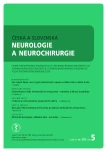Idiopathic Aqueductal Stenosis and Developmental Speech Disorder in Children with Neurofibromatosis von Recklinghausen type 1 – Two Case Reports
Authors:
M. Kalužová 1; B. Petrák 1; J. Lisý 2; M. Vaculík 3; Š. Bendová 4; V. Komárek 1
Authors‘ workplace:
2. LF UK a FN v Motole, Praha
Klinika dětské neurologie
1; 2. LF UK a FN v Motole, Praha
Klinika zobrazovacích metod
2; 2. LF UK a FN v Motole, Praha
Oddělení neurochirurgie
3; 2. LF UK a FN v Motole, Praha
Ústav biologie a lékařské genetiky
4
Published in:
Cesk Slov Neurol N 2012; 75/108(5): 633-636
Category:
Case Report
Overview
Neurofibromatosis von Recklinghausen type 1 (NF1) is an autosomal dominant neurocutaneous disorder, with incidence of 1 : 2,500–3,000 and a high rate of new mutations. This multisystem disorder is frequently associated with tumours. Hydrocephalus in NF1 patients is either secondary to brain expansion or as a result of idiopathic aqueductal stenosis. Learning disability, behavioural problems and speech development disorders are common in NF1 children. We are presenting two case reports of NF1 children with developmental speech disorder and hydrocephalus consequent to idiopathic aqueductal stenosis. One child developed stenosis during follow up. Coincidence of hydrocephalus due to idiopathic aqueductal stenosis and severe developmental speech disorder has not been described yet.
Key words:
neurofibromatosis von Recklinghausen type 1 – hydrocephalus – aqueductal stenosis – speech development disorder
Sources
1. Créange A, Zeller J, Rostaing- Rigattieri S, Brugiéres P, Degos JD, Revuz J. Neurological complications of neurofibromatosis type 1 in adulthood. Brain 1999; 122(3): 473– 481.
2. Ferner RE, Huson SM, Thomas N, Moss C, Willshaw H, Evans DG. Guidelines for the diagnosis and management of individuals with neurofibromatosis 1. J Med Genet 2007; 44(2): 81– 88.
3. Riccardi VM. Neurofibromatosis: past, present, and future. N Engl J Med 1991; 324(18): 1283– 1285.
4. Williams VC, Lucas J, Babcock MA, Gutmann DH, Korf B, Maria BL. Neurofibromatosis type 1 revisited. Pediatrics 2009; 123(1): 124– 133.
5. National Institutes of Health Consensus Development Conference Statement: Neurofibromatosis. Arch Neurol 1988; 45(5): 575– 578.
6. DiPaolo DP, Zimmerman RA, Rorke LB, Zackai EH, Bilaniuk LT, Yachnis AT. Neurofibromatosis type 1: pathologic substrate of high‑signal- intensity foci in the brain. Radiology 1995; 195(3): 721– 724.
7. Leisti EL. Radiologic findings of the head and spine in neurofibromatosis 1 (NF1) in Northern Finland. Academic Dissertation. Oulu, Finland: University of Oulu and Oulu Univestity Hospital 2003.
8. Horwich A, Riccardi VM, Francke U. Brief clinical report: aqueductal stenosis leading to hydrocefalus – an anusual manifestation of neurofibromatosis. Am J Med Genet 1983; 14(3): 577– 581.
9. Riccardi VM. Neurofibromatosis: Phenotype, Natural History, and Pathogenesis. 2nd ed. Baltimore: The Johns Hopkins University Press 1992.
10. Fahsold R, Hoffmeyer S, Mischung C, Gille C, Ehlers C, Kücükceylan N et al. Minor lesion mutational spectrum of the entire NF1 gene does not explain its high mutability but points to a functional domain upstream of the GAP‑related domain. Am J Hum Genet 2000; 66(3): 790– 818.
11. Bendova S, Krepelova A, Petrak B, Kinstova L, Musova Z, Rausova E et al. Novel mutations in the NF1 gene in Czech patients with neurofibromatosis type 1. J Mol Neurosci 2007; 31(3): 273– 279.
12. McGaughran JM, Harris DI, Donnai D, Teare D, MacLeod R, Westerbeek R et al. A clinical study of type 1 neurofibromatosis in north west England. J Med Genet 1999; 36(3): 197– 203.
Labels
Paediatric neurology Neurosurgery NeurologyArticle was published in
Czech and Slovak Neurology and Neurosurgery

2012 Issue 5
- Metamizole vs. Tramadol in Postoperative Analgesia
- Memantine in Dementia Therapy – Current Findings and Possible Future Applications
- Memantine Eases Daily Life for Patients and Caregivers
- Metamizole at a Glance and in Practice – Effective Non-Opioid Analgesic for All Ages
- Advances in the Treatment of Myasthenia Gravis on the Horizon
Most read in this issue
- Motor Stereotypies in Childhood – Case Reports
- Emotional Memory – Pathophysiology and Clinical Associations
- Neurological Complications Associated with Assisted Reproductive Technology – a Case Report
- Cerebrospinal Fluid Triplet in the Diagnosis of Alzheimer-Fischer disease
